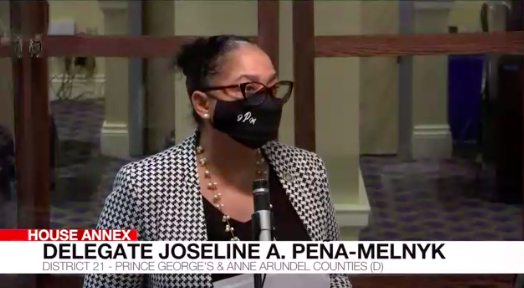In support of a bill that would make “Juneteenth” a state and employee-paid holiday, a Maryland Delegate on Monday gave an impassioned speech, which ended with a standing ovation from some colleagues.
Others in the Legislature were equally impassioned that including paid leave in the bill could be costly, especially during a year that many Marylanders have struggled financially.
Del. Joseline Peña-Melnyk, D-Prince Georges and Anne Arundel, argued in support of HB448 on the floor of the House annex on Monday as she and other colleagues fought for the bill to advance to the Senate.
“Powerful words from Joseline Peña-Melnyk this morning in support of making Juneteenth a paid state holiday,” Del. Jheanelle Wilkins, D-Montgomery, wrote in a tweet Monday. “Proud to cast my vote green.”
HB448, which would take effect on June 1, if passed, establishes Juneteenth National Freedom Day as a state legal and employee holiday on June 19.
“Let’s talk about what Juneteenth is,” Peña-Melnyk said on the House floor Monday. “It is the independence day of the African American citizens. It is the day that Blacks were recognized as people. It is the day that Blacks stopped being property. It is the day that Blacks could claim citizenship, but not many people know that.”
On June 19, 1865, two years after President Abraham Lincoln had signed the Emancipation Proclamation, Union Soldiers arrived in Texas to inform people that the war was over and enslaved people were now freed.
That day, known as Juneteenth to many, was celebrated unofficially in the African American community, and in 1980, Texas became the first state that had officially made Juneteenth a holiday.
“We are (ensuring) that the 6 million people living in Maryland know what that day stands for, so when they see someone that looks like me, they can think about what that community has gone through,” Peña-Melnyk said.
Lead sponsor of HB448, Del. Andrea Fletcher Harrison, D-Prince George’s, testified during a March 16 committee hearing that Capital News Service viewed that everyone should recognize this holiday, whether or not they identify as Black.
In 2014, a bill was passed that required the governor annually to proclaim June 19 as Juneteenth National Freedom Day, a commemorative day in Maryland.
“There has been very little done to truly appreciate the blood, sweat, and tears of those Blacks that built this state by way of their servitude,” Harrison said. “It is time for us to celebrate this as a paid holiday.”
Currently, Maryland recognizes 16 legal holidays and 12 State employee holidays, according to the bill’s policy analysis, and if passed, Juneteenth National Freedom Day would join those dates.
The policy analysis also states that, “a State employee who is required to work on an employee holiday receives compensatory time for that work. An employee not scheduled to work on an employee holiday, but otherwise required to work on that day, is eligible for compensation.”
Harrison also testified that establishing Juneteenth as a holiday would serve as a way for Maryland to recognize that the country has not fully addressed our past.
She cited the recent deaths of Ahmaud Arbery, Breonna Taylor, and George Floyd, all Black Americans who died last year and whose deaths she said sparked a revolution in America.
Harrison described the revolution as people around the world beginning to “open their eyes to the plight of Black people in this country.”
“It is important to recognize that Black Americans have been fighting for justice since this country’s inception,” Harrison testified.
During the House floor session Monday, Minority Whip Del. Kathy Szeliga, R-Baltimore and Harford counties, argued that the bill should be declared a legal holiday, but not yet an employee-paid holiday.
“When we have more than 1 million Marylanders on unemployment, should we give the 71,000 state workers a paid day off?” Szeliga argued. “I asked. I pleaded. I begged leaders here in the House of Delegates to make this a legal holiday that we can all get behind without it being a paid day off.”
Szeliga argued that the small businesses who struggled during the pandemic would be the ones to pay the taxes to support this bill and would not be able to celebrate this paid day off.
The policy analysis for HB448 estimates state expenditures increasing at least $1.9 million annually for overtime costs.
“I desperately want to vote for this bill, but I cannot burden those people with a multimillion dollar bill to help people who have had a paycheck over this pandemic.”
Peña-Melnyk countered Szeliga and argued that Maryland has done a lot for the people that Szeliga referenced as struggling, citing the Maryland RELIEF Act and other bills that have passed to aid Marylanders during the pandemic.
“We are and have been responsible,” Peña-Melnyk said. “However, this bill speaks volumes because many of those state workers are people of color. … Many of them, while we can stay home, risk their lives every day without proper PPE. They’re taking care of us so that the economy can keep running.”
Peña-Melnyk also argued that people of color and immigrant communities have experienced the disparate effects of the pandemic most.
She cited Prince George’s County, a majority-minority county, and Hyattsville, a city with a large immigrant population, as having some of the highest-reported cases of Covid-19 in the state.
The bill advanced in the House of Delegates with a vote of 112-24 and has been sent to the Senate, where the Education, Health, and Environmental Affairs Committee will have a hearing on it.

